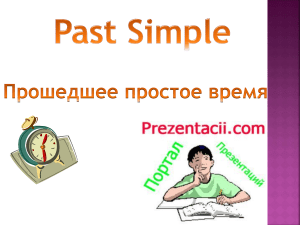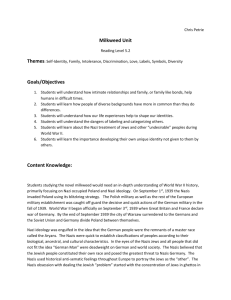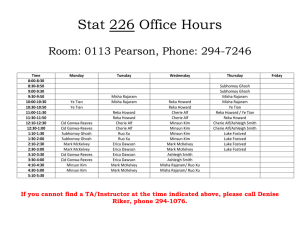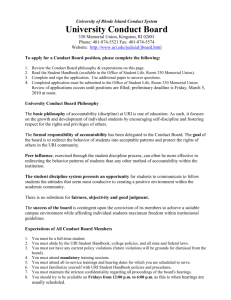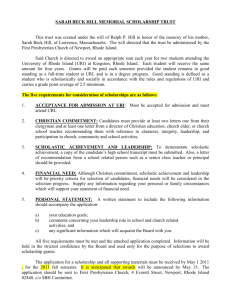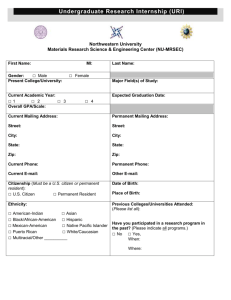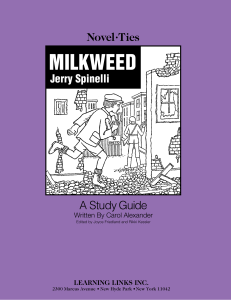Milkweed Guided Reading Lesson Plan: WWII & Comprehension
advertisement
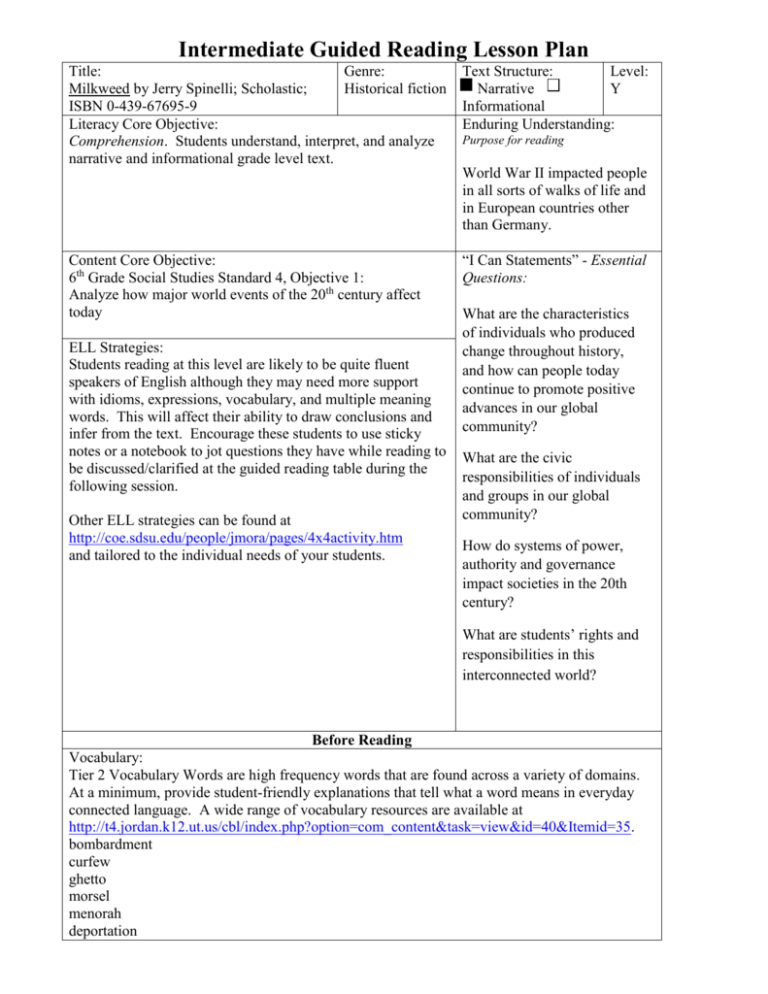
Intermediate Guided Reading Lesson Plan Title: Genre: Milkweed by Jerry Spinelli; Scholastic; Historical fiction ISBN 0-439-67695-9 Literacy Core Objective: Comprehension. Students understand, interpret, and analyze narrative and informational grade level text. Text Structure: Level: Narrative Y Informational Enduring Understanding: Purpose for reading World War II impacted people in all sorts of walks of life and in European countries other than Germany. Content Core Objective: 6th Grade Social Studies Standard 4, Objective 1: Analyze how major world events of the 20th century affect today ELL Strategies: Students reading at this level are likely to be quite fluent speakers of English although they may need more support with idioms, expressions, vocabulary, and multiple meaning words. This will affect their ability to draw conclusions and infer from the text. Encourage these students to use sticky notes or a notebook to jot questions they have while reading to be discussed/clarified at the guided reading table during the following session. Other ELL strategies can be found at http://coe.sdsu.edu/people/jmora/pages/4x4activity.htm and tailored to the individual needs of your students. “I Can Statements” - Essential Questions: What are the characteristics of individuals who produced change throughout history, and how can people today continue to promote positive advances in our global community? What are the civic responsibilities of individuals and groups in our global community? How do systems of power, authority and governance impact societies in the 20th century? What are students’ rights and responsibilities in this interconnected world? Before Reading Vocabulary: Tier 2 Vocabulary Words are high frequency words that are found across a variety of domains. At a minimum, provide student-friendly explanations that tell what a word means in everyday connected language. A wide range of vocabulary resources are available at http://t4.jordan.k12.ut.us/cbl/index.php?option=com_content&task=view&id=40&Itemid=35. bombardment curfew ghetto morsel menorah deportation Activate/Build Prior Knowledge: Using a map such as this one http://www.mapsofworld.com/world-maps/world-war-ii-map-ofeurope.html help students see the relationship between Germany and Warsaw, Poland. This book takes place during the German occupation of Poland. You can also share this information with students about the Warsaw ghetto http://www.warsaw-life.com/poland/warsaw-ghetto. Comprehension Strategy: Inferring/Drawing Conclusions During Reading Using appropriate Guided reading strategies, students will be reading at their own pace and teachers will be listening to students read, monitoring, giving feedback, taking anecdotal notes and running records. Attend to Comprehension Within, Beyond, & About the text. After Reading Attend to Comprehension Within, Beyond, & About the text: Discussion questions: Is the main character’s name really “Stopthief”? What do you think about him so far? (p. 3) How do you feel about the boys’ conversation about who hates them on page 8? Why are they saying that? What are some things that you already know about Uri? (p. 11) How does the boy respond to the parade? Why is he surprised that “no one was cheering, or even smiling?” (p. 19) At the beginning of chapter 6 the boy says, “I had not known bread could be given”. What does that make you think about his previous life? What do you think about the story that Uri gives Misha? Why does he do that? (p. 31) How did you respond to the incident with Janina’s cake? (p. 35-36) What does Uri mean on page 38 when he says, “Don’t be too glad?” Uri says, “When you’re nothing, you’re free to believe anything.” Do you agree? (p. 49) Stop at page 59 to make a prediction about what might happen with Uri and Misha. Why does Misha lose the urge to ride the horses? (p. 65) What do you make of Misha’s reaction to the “parade” on p. 71? The boys have a discussion about angels and oranges and if they exist or not on page 88. This is similar to the scene in Peter Pan when the Lost Boys discuss mothers and if they exist or not. If you were an author writing a similar scene, what would you have the boys debate? Why does Mr. Milgrom give Misha an armband on page 95? On page 117 Misha decides he no longer wanted to be a jackboot. Why? What was your reaction when you read about the crows, “They ate people.” (p. 131) How do you like Enos’ description of America on page 136? Why does Janina bring the milkweed pod to her mother’s grave? (p. 151) Share your reaction to Mr. Milgrom having to explain to Misha what “happy” is on page 158. What is wrong with Janina on page 160? What are your thoughts about the “candy mountain man”? Has your opinion of Uri changed from the beginning of the book to the interaction between he and Misha on page 170? Stop at page 181 to make predictions about how the book might end out. Stop at page 186 to process what has just happened. Stop again at page 194 to discuss the developments in the plot. What does Misha mean when he said, “But I had found something” on page 201? After reading the book, discuss how the voice changes through the book as Misha’s name changes. Content Core Integration:(Science, Soc. St., Math, etc.) Assessment: Activities: Using at least three characters in the book Milkweed for examples, write a five-paragraph essay about the impact of World War II on people in Warsaw, Poland. For a lesson series on the five-paragraph essay go to http://www.create.cett.msstate.edu/create/classroom/lplan_vie w.asp?articleID=171. There is also a video on writing a five-paragraph essay at BrainPop.com. This book is reminiscent Spinelli’s book Maniac Magee. After reading both books, students could complete a Venn diagram and compare/contrast paper on the two. World War II information is available at http://www.historyplace.com/w orldwar2/. *Not all activities will be done in each lesson. Some lessons may take multiple days to complete. However, all students should be reading each time you meet.
